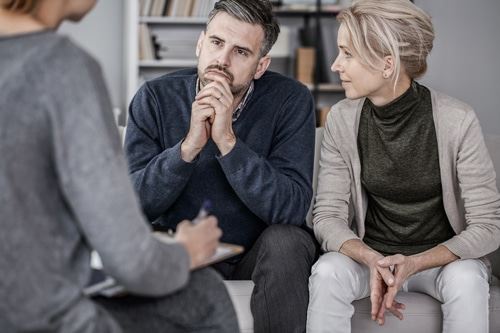How-To Guide: Helping a Spouse Who's an Addict
Being married can be a fulfilling and wonderful experience. Marriages don’t come without their struggles though. This is especially true if a person is married to an addict. This is because addiction causes tension, pain, and stress for both the person with addiction and his or her spouse. Being the spouse of an addict can be a complicated and stressful situation. This is why it’s important to know how to help your spouse without enabling him or her.
We’ll be taking a look at all the ways you can help your spouse dealing with addiction. While it may not be easy, there are many helpful things you can do as the spouse of an addict. If you or a loved one is dealing with an addiction and need immediate help, Grace Land Recovery is here for you.
Recovery Is Possible
Take Back Your Life Today
Hear From Past Client's
“I came here a broken man and was greeted with open arms. If you are struggling with addiction the folks down at Grace Land got you covered. Y'all will always hold a special place in my heart.”
- Jon A.
“Great staff!!! They definitely go above and beyond here! Thanks for helping me save my life!! Y’all are awesome!”
- Amber N.
“Grace Land Recovery goes above and beyond in providing therapeutic methods to attain and maintain sobriety. The staff is personally invested in helping their clients turn their lives around.”
- Jack R.
“What an amazing program and caring staff Grace Land Recovery has! I highly recommend this program to those seeking help in Memphis. Phil is the man!”
- Troy R.
“Amazing staff. Thank you for everything.”
- Ashley M.
Addiction In a Relationship
When one person in a relationship is addicted to a drug, his or her behavior and mindset can change for the worse. In some severe cases, a partner may become abusive. This can be a scary and problematic situation.
A person is not his or herself when suffering from addiction. For example, people that suffer from addiction may be deceitful or lie to get more drugs. When doing so, they may even pass the blame to others if they get caught.
Being in a relationship with someone that suffers from addiction can cause problems for both partners and can create an unstable and tense environment. Not to mention, things can get even more problematic if there are children involved.
A child’s development can be impacted negatively if one or both parents suffer from an addiction. Not to mention the financial, legal, and intimacy problems that come with being the spouse of an addict. There are several things to keep in mind when helping a loved one get help. This includes being supportive while not enabling them.
How Can You Help Your Addicted Spouse?
While it may seem like a lost cause, there are certain things you can do to help as the spouse of an addict. With this in mind, there are a lot of things to be aware of not doing to avoid enabling or developing a codependent relationship. Setting healthy boundaries and helping your loved one get better are both great ways to get your spouse on the right track.
Being married to an addict can be stressful but there are always things you can do to help. A few ways to set and keep healthy boundaries include:
- Allow room for family members that suffer from addiction to take care of themselves. This could come in the form of making their own lunches or cleaning up after themselves.
- Avoiding letting a loved one’s negative mood affect how your feel
- Taking care of yourself (eating well, visiting the doctor when needed, taking medication, and sleeping well)
- Manage stress any way you can, attend support groups, listen to positive music, take a walk, engage in hobbies, and try to keep your mind open and positive.
- Rely on the help of professionals like therapists, doctors, and other medical specialists. Learn more about our therapy options.
- Know when to get help in potentially dangerous situations.
These are great practices that make sure that you are setting boundaries while not enabling your spouse.
Therapy Options for Couples
 Therapy is one of the most important aspects of addiction treatment and recovery in general. As the spouse of an addict, you and your partner need to take the necessary steps towards therapy together.
Therapy is one of the most important aspects of addiction treatment and recovery in general. As the spouse of an addict, you and your partner need to take the necessary steps towards therapy together.
At one point, professionals thought that the best way to help people with addictions was to isolate them from their loved ones. However, in modern times, getting treatment as a family/couple has been proven to be very beneficial.
Attending couples therapy with a trained professional that works in the addiction field can do wonders. During these sessions, couples can communicate their problems better. Family therapy can be particularly effective.
Addiction is something that affects both individuals in a relationship and being on the same page is crucial. Resolving conflicts and learning how to help each other is part of the process.
With this in mind, it’s important to know that the journey doesn’t end when inpatient or outpatient treatment does. Addiction and recovery take time and care from both parties.
Being married to an addict, especially one in recovery, takes time. Together though, you can help maintain a healthy and supportive relationship as you both work towards sobriety. Therapy is a great help during addiction treatment and is one of many treatment options available at Grace Land Recovery.
Professional Addiction Treatment
It may be time to seek professional help, especially if you have begun to experience the negative effects of your/your partner’s addiction. Fortunately, there are several addiction treatment and resource options. Being the spouse of an addict can be stressful, however, with the right treatment, both you and your partner can live a better and more cohesive life.
Some of the most commonly abused drugs out there today include:
Each of these creates its own symptoms and effects on the body. It’s important to look out for behavior changes and physical symptoms of dependence and withdrawal. These can be anything from loss of interest in daily activities, changes in appearance, to lying or making excuses for drug use, physical symptoms, and other symptoms.
Here at Grace Land Recovery, we offer a wide range of addiction treatment options. If you or your spouse is dealing with addiction, we may be able to help. Let’s take a look at some of our treatment options with you in mind.
Outpatient Treatment
 Outpatient treatment is one of the most widely used addiction treatment methods. This form of treatment is made up of weekly visits to a rehab center (typically 3-5 days a week). These can be done during the day or at night.
Outpatient treatment is one of the most widely used addiction treatment methods. This form of treatment is made up of weekly visits to a rehab center (typically 3-5 days a week). These can be done during the day or at night.
Outpatient treatment doesn’t require you to live in a rehab center. This form of treatment is more flexible to fit your needs.
If you or your spouse have children, jobs, work, or other obligations, outpatient treatment is a great option. However, outpatient treatment is for milder cases of addiction and is commonly used after inpatient treatment has ended. This is because you are not staying at a rehab center with 24/7 support and constant guidance while receiving outpatient treatment. Outpatient treatment remains an effective and convenient way to overcome addiction though.
Partial Hospitalization Program (PHP)
Partial hospitalization programs are a form of outpatient treatment that requires more hours per week than a traditional outpatient program. PHP’s include sessions that are 5-8 hours a day and occur between 5-7 days a week. PHP is one of the more restrictive forms of treatment but allows a level of convenience like other forms of outpatient treatment.
PHP’s are usually very structured and intense and can closely resemble inpatient treatment types. Those who are in a PHP are allowed to spend their evening at their homes.
PHPs are great rehab options for people with more severe cases of addiction. They may also be a great option for you or your spouse.
Therapy
Therapy is a vital part of the addiction treatment process. Being married to an addict can be a complex and stressful situation. Typically, therapy is used to help addicts change their behaviors and thought processes for recovery. CBT, group, and family therapy are all options available at Graceland Recovery. Don’t wait to get the help you or your loved ones require.
Start the Journey Today
Being the spouse of an addict can be a painful and stressful situation for everyone involved. Fortunately, centers like Graceland Recovery can help. Our wonderful team will help you every step of the way and do everything they can to make sobriety/recovery a reality.
Don’t hesitate to contact us today to get you or your spouse’s addiction recovery journey started.
Recovery Is Possible
Take Back Your Life Today
Hear From Past Client's
“I came here a broken man and was greeted with open arms. If you are struggling with addiction the folks down at Grace Land got you covered. Y'all will always hold a special place in my heart.”
- Jon A.
“Great staff!!! They definitely go above and beyond here! Thanks for helping me save my life!! Y’all are awesome!”
- Amber N.
“Grace Land Recovery goes above and beyond in providing therapeutic methods to attain and maintain sobriety. The staff is personally invested in helping their clients turn their lives around.”
- Jack R.
“What an amazing program and caring staff Grace Land Recovery has! I highly recommend this program to those seeking help in Memphis. Phil is the man!”
- Troy R.
“Amazing staff. Thank you for everything.”
- Ashley M.
Enabling a Loved One
Being the spouse of an addict can end up causing massive stress and problems for both parties. While you love and support your spouse, it’s important to know when it’s time to get professional help.
One of the most destructive behaviors in these situations is enabling your spouse. While you may want to help your spouse out with his or her addiction, it’s important to not enable spouses in the process.
Enabling behavior occurs when you provide so much support for people in their lives that you make it easier for them to continue using drugs. Enabling can be done intentionally or unintentionally.
By failing to place consequences on people’s actions and continuing to make excuses for them, you’re encouraging them to continue using. It’s crucial to be aware of enabling behaviors, to make sure you’re not covering for your spouse on all fronts.
Some of the most common forms of enabling behaviors include the following:
- Lying or making excuses on behalf of the addict (at events, work, or other situations)
- Providing financial help for legal fees or other fees
- Going to bars or other events with your spouse where there will be drinking. Providing a ride home due to being under the influence is a form of enabling behavior
- Making up excuses to others when your spouse is dealing with withdrawals or hangovers
- Failing to set boundaries and picking up responsibilities at home
It can be extremely tough being the spouse of an addict because you’d do anything to protect your husband or wife and show him or her unconditional support. Unfortunately, this unconditional love and support can end up leading to a road of enabling behaviors, ones that keep your spouse from getting the help that he or she needs.
Find Your Recovery


